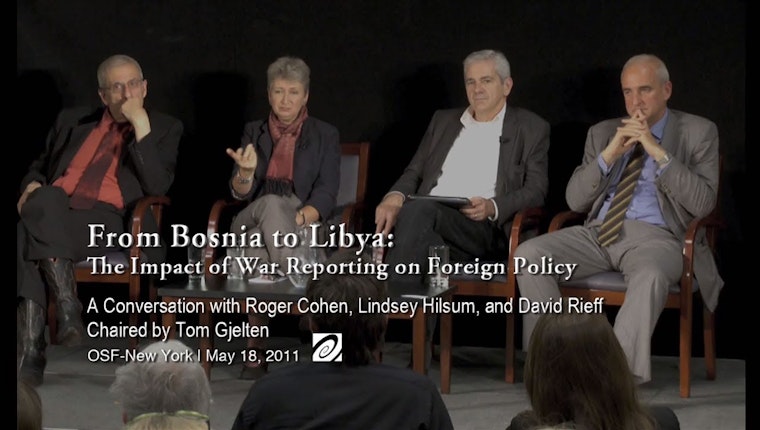War Reporters or Witnesses?
By Laura Silber

Watching Bosnian Serb general Ratko Mladic in dock in the Hague, I remembered the way he had barked out answers during an interview years earlier. That was before his forces had murdered some 8,000 Muslim men and boys in the town of Srebrenica in 1995. The last major suspect from the Balkans wars of the 1990s to be apprehended—Mladic’s arrest came late. But it was a victory for the tribunal set up in 1993 to try those most responsible for war crimes, crimes against humanity, and genocide in the wars in former Yugoslavia which began some 20 years ago this week.
The case against Mladic likely will be supported by reporting from Bosnia during that summer of 1995. As Serb forces were overrunning Srebrenica, Serbian leader Slobodan Milosevic in an interview told me “things got a little out of hand.” The scale of the massacre only came to light weeks later with reporters on the ground piecing together the stories of those who fled the enclave.
War correspondents give the public unprecedented access to military conflict, but once their stories are filed, what role—if any—should they play in the fight for justice?
Reporters Tom Gjelten, Lindsey Hilsum, Roger Cohen, and David Rieff last month came to the Open Society Foundations to discuss their time covering conflicts around the world and the impact of their stories on foreign policy. During that event, Mladic was still at large, but in their conversation (you can watch the full video below), the panelists touched on whether journalists should do more than report but also share their accounts with war crimes tribunals.
As international editor for Channel 4 News in the UK, Hilsum has covered conflicts around the world, she talked about her own decision to testify before the International Criminal Tribunal for Rwanda. Hilsum was the only English-speaking foreign correspondent in Rwanda when the genocide started in 1994 and her reporting at the time helped bring to light the atrocities taking place in the country. Hilsum attributed her decision to testify as her responsibility as a human being rather than as a journalist.
But she also noted that she was “in a unique position” as “most of the foreigners who were there [at the outset of the conflict] did not go out and see what was going on… That happened to me by accident of fate, and I thought that I have to testify, because I thought it was the right thing to do, and it's as simple as that.”
Hilsum decided to testify only as a witness to the situation rather than testifying against an individual, noting that testifying as against a specific witness might have compromised her effectiveness as a journalist. (You can watch the conversation on testifying at international tribunals starting at 0:50:55, above.)
The question remains as to whether reporters should testify at war crime tribunals. More than a decade ago my reporting was used as evidence at the Yugoslav tribunal and I was asked to testify. In the end, I felt my reporting spoke for itself. The decision to testify is a personal one, but regardless, the eyewitness reporting can used in the fight for justice.

Laura Silber is vice president of External Affairs and Office of the Chair at the Open Society Foundations.